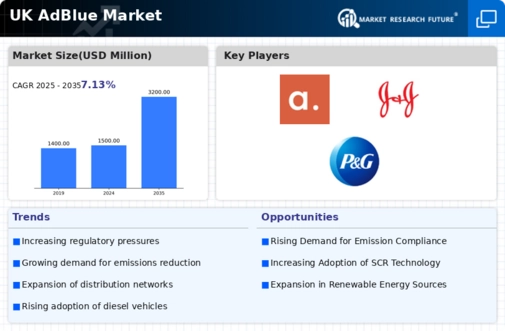Market Expansion
The UK AdBlue market is currently experiencing a phase of expansion, driven by the increasing adoption of diesel vehicles across various sectors, including transportation and logistics. The demand for AdBlue is expected to rise as more companies recognize the importance of compliance with emission regulations and the benefits of using SCR technology. As of January 2026, the market is witnessing a diversification of applications for AdBlue, extending beyond traditional automotive uses to include industrial machinery and agricultural equipment. This expansion is likely to create new opportunities for manufacturers and suppliers within the UK AdBlue market, as they seek to cater to a broader customer base. Furthermore, the growth of e-commerce and online sales channels is facilitating easier access to AdBlue products, potentially driving further market growth.
Consumer Awareness
Consumer awareness regarding the environmental impact of diesel vehicles is a crucial driver for the UK AdBlue market. As public consciousness about air quality and climate change grows, more consumers are becoming informed about the benefits of using AdBlue to reduce harmful emissions. This heightened awareness is reflected in the increasing sales of diesel vehicles equipped with SCR technology, which require AdBlue for optimal performance. According to recent data, the UK AdBlue market has seen a steady rise in consumption, correlating with the growing number of diesel vehicles on the road. As of January 2026, educational campaigns and initiatives by both government and industry stakeholders are likely to further enhance consumer understanding of AdBlue's role in mitigating environmental impact, potentially leading to increased market penetration.
Regulatory Compliance
The UK AdBlue market is significantly influenced by stringent regulatory frameworks aimed at reducing nitrogen oxide emissions from diesel vehicles. The UK government has implemented regulations that mandate the use of AdBlue in vehicles equipped with Selective Catalytic Reduction (SCR) technology. This compliance is not only a legal requirement but also aligns with the UK's broader environmental goals, including commitments to achieve net-zero emissions by 2050. As of January 2026, the market is witnessing an increase in demand for AdBlue, driven by the growing number of diesel vehicles that require this solution to meet Euro 6 emission standards. The regulatory landscape is expected to evolve further, potentially leading to increased adoption of AdBlue across various sectors, thereby bolstering the UK AdBlue market.
Sustainability Initiatives
Sustainability initiatives are increasingly shaping the UK AdBlue market, as both consumers and businesses prioritize environmentally friendly practices. The UK government has set ambitious targets for reducing greenhouse gas emissions, which has led to a greater emphasis on the use of AdBlue in diesel vehicles. As of January 2026, many companies are adopting sustainability strategies that include the use of AdBlue to comply with emission standards and enhance their corporate social responsibility profiles. This trend is likely to encourage more businesses to invest in AdBlue solutions, thereby driving demand within the UK AdBlue market. Additionally, partnerships between manufacturers and environmental organizations are emerging, aimed at promoting the benefits of AdBlue and its role in achieving sustainability goals. Such initiatives may further solidify the market's growth trajectory.
Technological Advancements
Technological advancements play a pivotal role in shaping the UK AdBlue market. Innovations in production processes and distribution methods have enhanced the efficiency and availability of AdBlue. For instance, the development of more sophisticated SCR systems in vehicles has increased the demand for high-quality AdBlue, as these systems require precise formulations to function optimally. Additionally, advancements in logistics and supply chain management have improved the distribution of AdBlue, ensuring that it is readily available to consumers and businesses alike. As of January 2026, the market is witnessing a trend towards the use of digital platforms for ordering and delivery, which could further streamline operations within the UK AdBlue market. These technological improvements are likely to foster a more competitive environment, encouraging manufacturers to innovate and enhance product offerings.













